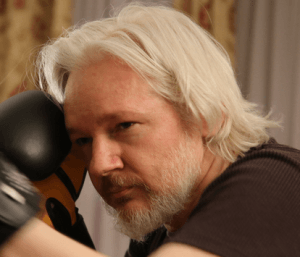Activist, hacker, fugitive: Julian Assange’s anti-secrecy crusade

Julian Paul Assange, once a hacker, is best known for engineering a massive disclosure of classified US military and diplomatic logs after founding WikiLeaks, an anti-secrecy group dedicated to “opening governments.”
Since he took refuge in the Ecuadorian embassy in London in 2012 to avoid possible extradition to Sweden in a sexual assault inquiry – later dropped – Assange has become a cause celebre for many left-wing politicians and free-speech activists.
Officials in the United States and Britain dismissed Assange’s early claims that Washington planned to have him extradited, but British police arrested him at the embassy on a US extradition warrant in April 2019.
The 49-year-old was born in 1971 in Townsville, north-eastern Australia, and grew up in an alternative household with “borderline hippies” for parents, Australian media have quoted him as saying.
By his own account, his childhood was rather idyllic, “pretty Tom Sawyer,” involving fishing and rafting.
It was also migratory. According to the daily Courier Mail, by the time he was 14 he had moved 37 times.
He was educated with a combination of home-schooling and correspondence courses. As a teenager, he demonstrated great skills with computers and for hacking, using the nickname “Mendax.”
In 1991, he hacked into the computer systems of the Australian National University and Australian Telecom, receiving a minor fine.
Assange later travelled, studied physics at the University of Melbourne and worked as a computer security consultant.
In 2006, he was part of the collective that launched WikiLeaks, a website that enabled anyone to anonymously submit leaked secret documents, which the organization would then vet.
The whistleblowing website became a household name following the 2010 release of documents revealing embarrassing details of the US wars in Afghanistan and Iraq and 250,000 diplomatic cables belonging to Washington’s foreign service.
The same year, Assange became spokesman for the collective after the group released a video from Iraq where the banter of US soldiers is heard as they shoot and kill suspected terrorists from a helicopter. Among the victims were two reporters.
WikiLeaks has also published documents related to banks and businesses, the Catholic Church, the Church of Scientology and governments, as well as emails and documents related to the 2016 US presidential campaign.
Assange, with his striking silver hair, visited numerous countries and addressed news conferences and seminars on WikiLeaks and its mission.
However, along the way Assange lost many of his early friends and supporters. His alleged authoritarian style, coupled with reported bouts of secrecy and paranoia, alienated many of his followers.
The gaps between Assange and his supporters grew wider after the Afghan war logs went public in 2010, and human rights groups became concerned that the exposure of informants’ names would lead to retribution.
Two women alleged they were sexually assaulted by Assange during his visit to Sweden in August 2010, prompting Swedish prosecutors to issue an arrest warrant.
Assange gave himself up to British police in December 2010.
A series of British court rulings upheld the extradition and in June 2012 he fled to the Ecuadorian embassy, where he was granted asylum.
Three cases of alleged sexual assault against Assange were dropped in 2014 due to the Swedish statute of limitations.
Assange was granted Ecuadorian citizenship in late 2017, but his relations with embassy staff and Ecuador’s President Lenin Moreno soured during 2018 and his visitors were restricted.
British police dragged Assange out of the embassy in April 2019. He was charged with skipping bail over the Swedish extradition case, then arrested the same day on the US extradition warrant.
While in the embassy, Assange fathered two children with his partner, Stella Moris, who has campaigned for his release.
In connection with this year’s Thanksgiving holiday, Moris posted a photo of their two children on Twitter writing: “These are Julian’s sons Max and Gabriel. They need their father. Our family needs to be whole again.”
The years in the embassy have taken a toll on Assange’s mental and physical health, according to his lawyers, doctors and UN experts.
The UN Working Group on Arbitrary Detention, a panel of independent legal scholars, ruled in 2016 that Assange had been subject to arbitrary detention since his first arrest in London in 2010 in connection with the Swedish allegations.
After visiting him in prison in May 2019, Nils Melzer, the UN rapporteur on torture, said Assange displayed “all the symptoms typical for prolonged exposure to psychological torture.”
Other experts and support groups such as The Doctors for Assange group said Assange had been subjected to ill-treatment by being denied to meet with his lawyers to prepare his defence.
“These irregularities and excesses cause helplessness, arbitrariness, threat, and isolation, all key components of psychological torture,” they said.
Michael Kopelman, a neuropsychiatrist at King’s College London, testified in September 2019 that Assange has suffered from depression and was at high risk of suicide.
Source: GNA
